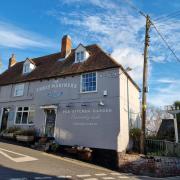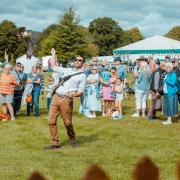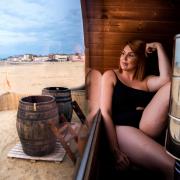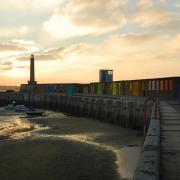The Tunbridge Wells theatre has been used for professional wrestling, masked balls, as an evacuation centre for London children in the Second World War, Morecambe and Wise were here and so was Priscilla, Queen of the Desert
This May the Assembly Hall Theatre, in the heart of Tunbridge Wells, is kicking upits heels for a very special 75th birthday.
Despite recent controversial headlines involving staff and budget cuts from Tunbridge Wells Borough Council, which owns and operates the venue, whatever lies ahead for the Crescent Road favourite, the anniversary will be celebrated throughout the year as a true milestone.
A vital part of the community since its early beginnings, it has become one of the most popular local venues and plays a vital role in Tunbridge Wells’ storied live theatre, past, present and future.
Originally built as an entertainment hall, the Assembly Hall Theatre has always offered a rich eclectic programme from operas and formal dances of the 1940s and 1950s to the rock ‘n’ roll bands of the 1960s, pantomimes, community shows and most recently touring productions of West End hits such as Priscilla Queen of the Desert, Chicago and Cabaret
Today, the theatre seats up to 1,000 people and offers a varied programme of performances with everything from family shows to classical music with more than 300 events held year on year.
The Assembly Hall first opened its door in 1939, under Marchioness Camden, as part of the celebrations of the 50th anniversary of the granting of the town’s charter in 1889.
It was the first hall in England to be constructed for adaptation as a broadcasting studio. The auditorium walls are treated with acoustic plaster and special overlapping flaps at the sides and tops of the stage can be left open when plays are in progress, or closed to form a perfect ‘sound box’ when the hall is used for public meetings, orchestral concerts and the like.
The Austrian oak hall floor measuring 80ft by 60 ft can comfortably dance 700 and its dance floor can be either sprung for dancing or locked for other occasions.
The ceiling of fibrous plaster is plainly moulded in a deep cornice, a square and then a carved soffit with square panelled recesses outlined in green and silver. Plain bands of green and silver relieve their wide expanse of the cornice, from which 10 chandeliers 11ft deep are suspended. This lighting is amplified by concealed lighting below the balcony. There are seven curtained windows, each measuring 16ft x 4ft, on either side of the auditorium.
Theatrical links
? Tunbridge Wells Operatic and Dramatic Society, now known as TWODS, presented the first production Pirates of Penzance from 31 May-3 June 1939. One of the oldest amateur societies in the UK, TWODS celebrates 125 years this year and marked its anniversary by staging Oliver! at AHT in April.
? The Royal Tunbridge Wells Symphony Orchestra and Kent Opera appeared regularly over the years, as well as the popular Kentainers.
? Youth Calling was a young amateur theatrical group that put on a variety of performers at AHT during the war. With about 60 in the cast, they rehearsed at St James Church Hall in Albion Road and performed to packed houses every week at the Assembly Hall. Sometimes their shows were so popular that members of the audience had to stand. Their pianist was Frank Ealing, who went on the play for Tunbridge Wells Operatic Society, an sometimes the troop would cycle down to Hastings and perform impromptu concerts on the beach (minus the piano!).
Timeline
1939: At the outbreak of the Second World War, London children were evacuated to the Assembly Hall Theatre to await alternative accommodation placement to safer areas in the UK.
Six penny dinners were open to all and provided daily by the Canteen section of the Women’s Voluntary Services for Civil Defence for the evacuees in the communal dining room. The meals were hugely popular (especially stew with boiled vegetables, followed by apple pudding and cheese and biscuit) and served on spotless white tablecloths, with new cutlery, glass and china. Prices 6d children, 1s adults.
1940s onwards: Wrestling – regularly sold out - was held fortnightly in the 1960s and then weekly. Several rows of seating were placed on the stage, with the wrestling ring in front. Three great stars of the time performed here: Jackie Pallo, Mick McManus and Kendo Nagasaki, predating Giant Haystacks and Big Daddy by about a decade.
Through the Second World War dances to entertain the troops would prove a key part of the war effort, along with the screening of films designed to boost public morale, and many fundraising events were held there.
Peanut Club: This was started during the Second World War to support Sir Archibald McIndoe, the plastic surgeon at The Queen Victoria Hospital in nearby East Grinstead who did so much to help servicemen burnt in action.
Funding was helped in 1931 when Mrs Gordon Clemetson, writing as ‘Aunt Agatha’ started the Peanut Club in the children’s section of the Kent and Sussex Courier newspaper. Mrs Clemetson promised a bag of peanuts to anyone giving 12 new pennies to the Queen Victoria Hospital Fund.
Guinea Pig Club: Similar to the Peanut Club, this club was formed in 1941 and made up of members who were recovering Second World War pilots and bomber crew from the Allied Air Force who had also suffered burns and were receiving treatment from Sir Archibald McIndoe. Many of these men had fought in the Battle of Britain. Annual fundraising events used to take place in Copthorne and East Grinstead, where performers such as Vera Lynn and Ken Dodd would perform free of charge. John Sumner (residential stage manager at AHT for nearly 40 years) used to volunteer his services, along with other members of AHT staff and was delighted to be made an honorary member of the Guinea Pig Club for putting together the sound and lighting for its yearly reunions.
1948: AHT held a masked fancy dress ball in January where hundreds of balloons, four containing vouchers for pairs of nylons specially flown in from America, floated down onto the dancers below. Film actress Christine Norden made a personal appearance.
1948: Richard Attenborough attended the Film Ball on 21 December.
1960s: Hospital radio was broadcast from AHT.
1962: Tunbridge Wells Borough Council allowed the BBC to use the projection room in AHT as an unattended studio and control room at a rent of £52 per year.
It opened on 6 February 1963 with a special live edition produced from the Assembly Hall Theatre of the Town and Country programme, featuring Tunbridge Wells.
This was the latest venture in the BBC’s plans to improve efficiency and speed up the service for both regional and national news programmes. The studio was not permanently manned, hence the name ‘unattended studio,’ it was simply there for the use of BBC correspondents, reporters, interviewers and production teams should the necessity arise for a programme to be sent out, live on the spot.
The lights, heating, microphone, amplifiers, etc all came on with the flick of a switch by the door and an ordinary telephone with a direct line to London brought the person into immediate contact with the London control room. Another flick of the switch on the Tunbridge Wells control panel brought the microphone into operation. The walls were treated so the voice was as clear as possible and room as whole was soundproofed.
1982: In May a Pearly Ball organised by Brian and Margaret Hemsley, Pearly King and Queen of Royal Tunbridge Wells, and Geoff Butler, was a big success, raising £4,409 for the Pembury Hospital Special Baby Care Unit.
Pearly kings and Queens, together with their Princess and Princesses, converged from all over London and the south east on the Assembly Hall for a charity ball.
1995: The Assembly Hall Theatre was listed as a building of special architectural and historical interest.
2001-2003
A refurbishment project was carried out at a cost of £2,000,000. This updated the building to modern theatre standards and current building legislation while preserving the original architect’s vision. It included stage electrics, a refurbished bar and foyer areas, some new theatre seating, toilets, redecorations and a new lift in the foyer among other improvements. The original colours of buff, green and silver were reintroduced into the auditorium.
2014
The highly colourful Tunbridge Wells Lantern Parade on 22 February was the first 75th anniversary launch event and on 24 May, the date of the Assembly Hall Theatre’s actual birthday, Bugle Boy - the life story of Glen Miller – will be on stage.
Theatre staff are busily capturing inspiring memories and moments from all visiting companies and artists over the coming year for a Backstage Book. These will be used as the foundation for an art project aimed at raising the aspirations of local young people.
A visual arts project with a local community group and one of the backstage technicians leading to the making of a film/audio living history is also ongoing.
SHOWS PAST AND PRESENT
Pantomime: Christmas at the theatre is well known for its pantomime and over the years AHT has welcomed Peter Pan, Snow White and the Seven Dwarfs, Cinderella, Aladdin, Jack and the Beanstalk, Sleeping Beauty.
Medium-sized West End shows: Blood Brothers, Joseph and the Amazing Technicolour Dreamcoat/, Carousel, The Blues Brothers
Big West End shows: Priscilla, Cabaret, Calendar Girls
We were here …
Comedy
Morecambe and Wise, Norman Wisdom, Tony Hancock, Ken Dodd, Lenny Henry/, Frank Skinner, Phil Jupitus, Dara O’Brian, Simon Amstell, Paul Merton, Graham Norton, Jimmy Carr, Harry Hill, Ruby Wax, Dylan Moran, Mickey Flanagan, Michael McIntyre, Alan Carr, Lee Evans, Jack Dee, Ross Noble, Lee Hurst, Dave Gorman, Cannon and Ball, Hale and Pace, Sarah Millican, Jo Brand, Al Murray, Julian Clary, The Mighty Boosh,Tim Minchin, Jim Davidson
Variety
Mickey Rooney, Paul McKenna, The Hairy Bikers, Sir Michael Parkinson, Pam Ayres, Derren Brown, Michael Barrymore, Paul Daniels, Danny La Rue
Music
Coolio, Let Loose, The Stranglers, The Rolling Stones, Bill Wyman & The Rhythm Kings, Roland Gift and The Fine Young Cannibals, Des O’Connor, Joan Armatrading, David Essex, Jools Holland, The Osmonds, Bob Geldof, The Kinks, Shakin’ Stevens, Adam Ant, Ant and Dec, Shawoddy Wody, David Essex, Hot Chocolate, Leo Sayer, Val Doonican, Status Quo
Classical
Stephane Grapelli, Vanessa Mae, Richard Clayderman, Julian Lloyd Webber, James Galway, Yehudi Menuhin
Jazz
George Melley, Humphrey Lyttelton, Georgie Fame, Acker Bilk, The Dubliners, Shane MacGowan, Ralph McTell
Folk
Paul Carrack, Kate Rusby
Ballet
Margot Fonteyn
Children’s theatre
Chuckle Bros, Basil Brush, Sooty and Sweep, The Tweenies, Scooby Doo, Bodger and Badger, Rod, Jane and Freddy
The future
Assembly Hall Theatre director Brian McAteer says: “Over the years the theatre has evolved. We used to be a recognised centre of professional wrestling; today we offer a wide variety of entertainment for all ages and all tastes, from drama to West End musicals and pantomime.
“Whatever the future holds, maybe a new 21st-century venue, we intend to continue to be an affordable regional venue for the very best in quality entertainment.”
GET IN TOUCH
Assembly Hall Theatre
Crescent Road
Tunbridge Wells TN1 2LU
Box office: 01892 530613
For full list of May shows, visit: www.assemblyhalltheatre.co.uk/2/Calendar
Get involved: do you have a special memory connected with the Assembly Hall Theatre in Tunbridge Wells? Let us know: email editor@kent-life.co.uk.



























